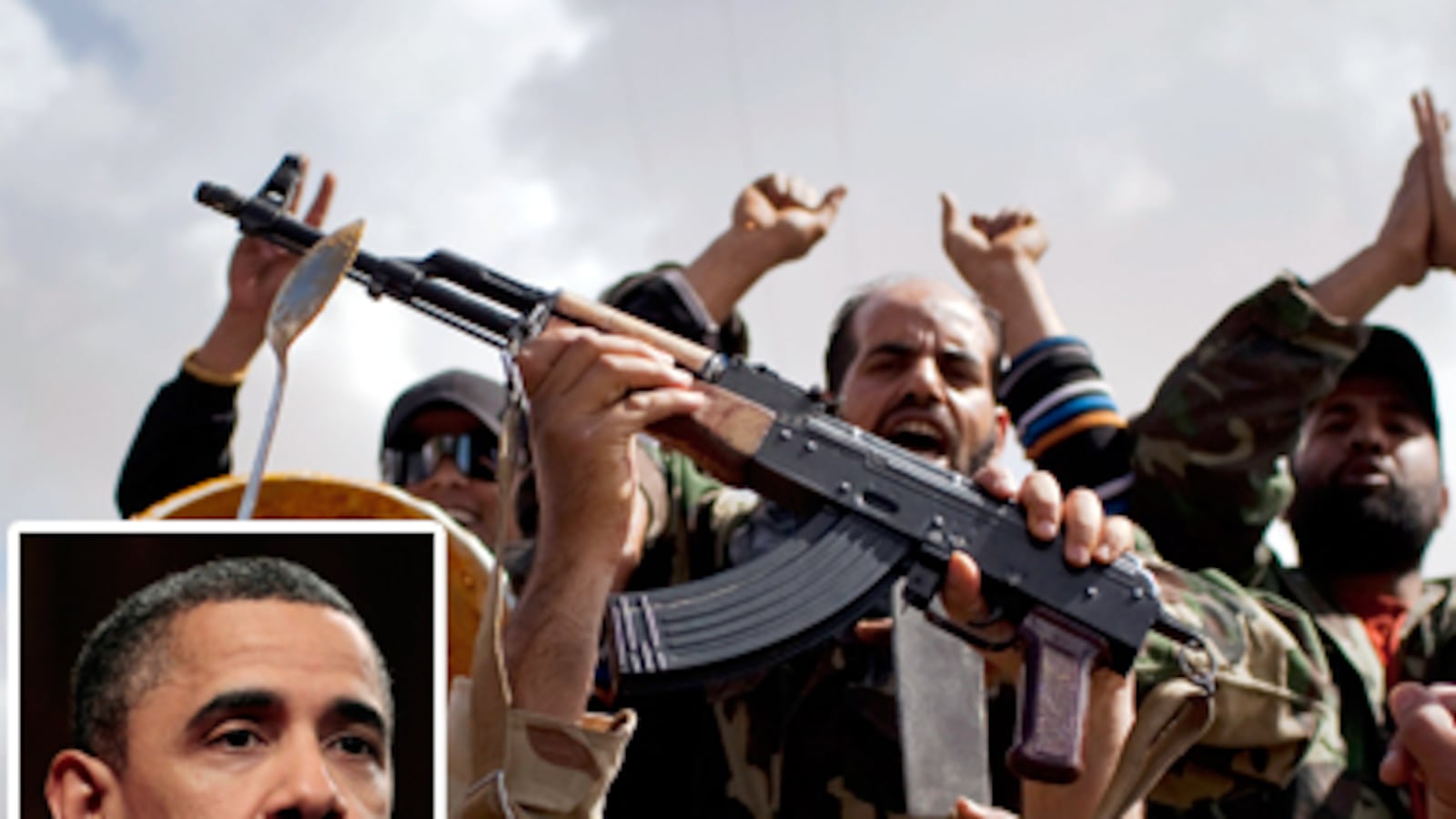The U.S. intervention in Libya is dividing commentators—some claim it a necessary step, others worry we’re doomed. Howard Kurtz on the hot media debate over Obama’s new war. Plus, complete coverage of Libya.
At first, President Obama’s decision to back military action against Libya—with the blessing of a U.N. resolution—seemed to take the media by surprise.

Major news organizations reported on the bombs and cruise missiles designed to enforce a no-fly zone, but fumbled when it came to the question of whether this was tantamount to a long-term commitment to oust Muammar Gaddafi.
Now that the commentators are weighing in, Obama’s move seems to have united the right and the center-left behind the barely debated military action—but not the most liberal players in the punditocracy.
The reasoning may vary. But where the neocons (who were big boosters of taking out Saddam) and the left-leaners (some of whom supported the invasion of Baghdad but many of whom came to regret it) believe we have a moral obligation to rescue those who would be crushed by Gaddafi—even though one could make the same argument about intervening in Bahrain or Yemen. The full-throated liberals (who almost uniformly opposed going into Iraq) say we can’t act as the world’s policeman and that the ill-advised intervention could mire us in a third war in a Muslim country.
On the conservative side, Weekly Standard Editor Bill Kristol —one of the most vocal cheerleaders for the Iraq war—is only sorry that Obama didn’t move faster: “Despite his doubts and dithering, President Obama is taking us to war in another Muslim country. Good for him.
The full-throated liberals (who almost uniformly opposed going into Iraq) say we can’t act as the world’s policeman.
“The president didn’t want this. He’s been so unhappy about such a possibility—so fearful of such an eventuality—that first he tied himself in knots trying to do nothing. Then he decided that, if he had to act, it would be good to boast that he was merely following the Arab League and subordinating American action to the U.N. Security Council. After all, nothing—nothing!—could be worse than the perception that the United States was ‘invading’ another Muslim country. “Rubbish. Our ‘invasions’ have in fact been liberations. We have shed blood and expended treasure in Kuwait in 1991, in the Balkans later in the 1990s, and in Afghanistan and Iraq—in our own national interest, of course, but also to protect Muslim peoples and help them free themselves. Libya will be America’s fifth war of Muslim liberation.”
The New Republic strikes a markedly similar tone in weighing the president’s action:
“It was a decision we wish he would have arrived at weeks ago. But it was the right decision. And Obama deserves credit for having made it…
"The most immediate goals of the mission were quite clear: first, to prevent a slaughter in Benghazi, a slaughter that Gaddafi himself had promised was only hours away; and second, to tip the balance of power in the rebellion away from Gaddafi, so that his forces were unable to retake any more of the country, thus extinguishing the resistance for good. On these terms, the intervention has already been a success.
“As for what comes next: It is difficult to say whether Western airpower can tip the balance of power toward the rebels so dramatically that they will be able to topple Gaddafi. We certainly hope so. But even if it does not, an intervention that at least allows the rebels to maintain a free zone in Libya will certainly be a better outcome than the alternative—a Libya reunited under Gaddafi’s iron control.”
But TPM’s Josh Marshall says the military action seems doomed to failure: “A week ago a relatively limited intervention probably could have sealed the rebels' victory, preventing a reeling Qaddafi from fully mobilizing his heavy armaments. But where do we expect to get from this now? It's not clear to me how the best case scenario can be anything more than our maintaining a safe haven in Benghazi for the people who were about to be crushed because they'd participated in a failed rebellion. So Qaddafi reclaims his rule over all of Libya except this one city which has no government or apparent hope of anything better than permanent limbo. Where do we go with that?
“We're calling a time out on a really ugly situation the fundamental dynamics of which we aren't in any position to change. That sounds like a mess.”
And The Nation sees disturbing echoes of America’s other military conflicts:
“The language of the U.N. resolution, while it forbids ‘foreign occupation,’ is so broadly worded that many argue it amounts to an open-ended declaration of war against Libya. As is usually the case with military action, it's easy to make the argument for war with Libya and to begin hostilities; it's impossible to know when or how the conflict will end.
“Indeed, there is a worrying dimension to this intervention, in that it reflects a mindset that associates U.S. foreign policy, whether alone or as part of an allied force, with heroic crusades to bring down the bad guys. But it is exactly that mindset that has done so much damage in the Middle East over the years and that has saddled us with the costly burdens of two ongoing wars in Muslim lands.”
Unless Gaddafi is toppled in a short period of time, this debate—joined by Congress, which Obama circumvented—is going to intensify. And unlike Afghanistan and Iraq, Libya is clearly and unequivocally Obama’s war.
Howard Kurtz is The Daily Beast's Washington bureau chief. He also hosts CNN's weekly media program Reliable Sources on Sundays at 11 a.m. ET. The longtime media reporter and columnist for The Washington Post, Kurtz is the author of five books.






